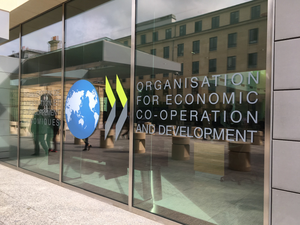Businesses
50 pc of Indian GPS sector to execute 1st GenAI solution within 1 yr: Report
New Delhi, April 8 (IANS) About 50 per cent of the Indian Government and Public Services (GPS) organisations are ready to implement their first generative artificial intelligence (GenAI) solution within one year, a new report said on Monday.
With this implementation, various departments and functions of the government are expected to have a significant impact, ranging from data-driven decision-making, enhanced citizen engagement and access to services, to driving overall efficiencies across processes, according to EY India.
“The Indian government has identified AI as an important strategic technology and has also launched the National AI Strategy as well as other initiatives to promote AI adoption. GenAI enables smarter governance and fosters innovation in public service delivery,” said Anurag Dua, Partner and Leader, Public Finance Management, EY India.
According to the report, GenAI holds significant promise for transforming the GPS sector by automating tasks, enhancing policy analysis, and promoting transparency.
About 61 per cent of the GPS organisations believe that GenAI will improve the citizen experience, while 67 per cent said that it will act as a catalyst to drive innovation.
The report further revealed that 30 per cent of the organisations believe that it will increase productivity while only 9 per cent mentioned that it will bring job displacement due to automation.
The major challenges that organisations are facing in adopting GenAI are data privacy (48 per cent), skill gap (36 per cent) and lack of unclear use cases (26 per cent), the report noted.
–IANS
shs/dan
Businesses
Adani Group's Vizhinjam Port receives first mothership, puts India in world league

Thiruvananthapuram, July 11 (IANS) Adani Group’s Vizhinjam Port, India’s first trans-shipment port near Kovalam Beach in Kerala, received its first mothership on Thursday.
‘San Fernando’, a vessel of the world’s second-largest shipping company Maersk, arrived at the port country with over 2,000 containers on it, thus creating history.
The giant vessel was given the traditional water salute following which it berthed successfully.
With the arrival of the first mother ship, Adani Group’s Vizhinjam Port has catapulted India into the world port business as globally this port will rank 6th or 7th.
Those present to receive the mothership included State Ports Minister V.N. Vasavan, officials from the Adani Port and senior state government officials.
The official function will take place on Friday. It will be attended by Union Minister for Ports, Shipping and Waterways Sarbananda Sonowal, Chief Minister Pinarayi Vijayan and Adani Ports and SEZ Ltd (APSEZ) Managing Director Karan Adani.
Soon after the official inauguration, the mothership will move to its next destination at Colombo and after that many more ships are scheduled to arrive with cargo.
Friday will mark the official completion of the first phase of the port, which has a 3,000-metre breakwater and 800-metre container berth ready.
Of the 32 cranes required, all but one have come. A 1.7 km approach road for connectivity is almost complete, while the office building, security area and electric lines are all ready.
Another feature of this port is that it is the first semi-automated container terminal in the country and will also be a global bunkering hub, supplying clean and green fuels like hydrogen and ammonia. Full-fledged commercial operations in the port are slated to begin in a few months.
The second and third phase of the project is planned to be completed in 2028 and will be one of the greenest ports in the world.
The port is also strategically located as it is just 10 nautical miles from the International Shipping Route connecting Europe, the Persian Gulf and the Far East.
–IANS
sg/dpb
Businesses
Retail inflation for industrial workers declines to 4-month low

New Delhi, July 11 (IANS) Retail inflation for industrial workers eased to a 4-month low of 3.86 per cent in May compared to 4.42 per cent in the same month a year ago, according to the latest data released by the Labour Ministry.
The Consumer Price Index-Industrial Workers (CPI-IW) has been steadily declining since February this year and was 3.87 per cent in April 2024, figures compiled by the Labour ministry show.
The All-India CPI-IW for May 2024 increased by 0.5 points and stood at 139.9 points. It was 139.4 points in April 2024.
The fuel & light segment declined to 149.5 points in May from 152.8 points in April 2024.
The food and beverages group increased to 145.2 points in May from 143.4 points in April this year.
The Labour Bureau, under the Ministry of Labour & Employment, compiles the Consumer Price Index for Industrial Workers every month on the basis of retail prices collected from 317 markets spread across 88 industrially important centres in the country.
–IANS
sps/svn
Businesses
India to see rise in private consumption in FY25 driven by rural demand

New Delhi, July 11 (IANS) Driven by rural demand recovery owing to normal monsoon and moderating inflation, India is projected to see a surge in private consumption in the current fiscal, a report has said.
According to India Ratings and Research, the rise in private consumption would lead to more balanced growth, reducing the disparity between premium and value segments.
According to the report, urban demand will also continue to grow but at a slower pace.
The growth disparity would moderate in FY25, exhibiting slightly more broad-based growth contours, said India Ratings.
There has been a constant rise in rural consumption demand in recent years.
Riding on a revival in rural demand and steady urban growth, the fast-moving consumer goods (FMCG) sector in India is also projected to see a revenue growth of 7-9 per cent this fiscal.
According to a recent Crisil Ratings’ study of 77 FMCG companies, “We expect volume growth of 6-7 per cent in fiscal 2025 from the rural consumers (40 per cent of overall revenue), supported by expectation of better monsoon benefitting agricultural production, and hike in minimum support price supporting farm incomes.
According to the report, higher government spending on rural infrastructure, primarily through Pradhan Mantri Awaas Yojana-Grameen (PMAY-G) for affordable houses, will aid higher savings in rural India, supporting their ability to spend more.
On the other hand, according to the Crisil report, volume growth from urban consumers will remain steady at 7-8 per cent during fiscal 2025 supported by rising disposable incomes and continued focus on premium offerings by the players, especially in the personal care and home care segments.
The food and beverages (F&B) segment is expected to grow 8-9 per cent this fiscal, aided by improving rural demand.
–IANS
na/dpb
Businesses
Five automakers to recall over 1,56,000 cars for faulty parts

Seoul, July 11 (IANS) Kia, Nissan Korea and three other carmakers will voluntarily recall more than 1,56,000 vehicles due to faulty components, the transport ministry here said on Thursday.
The five companies, also including Hyundai Motor Co., Porsche Korea and Toyota Motor Korea Co., will recall 1,56,740 units of 32 different models, the Ministry of Land, Infrastructure and Transport said in a statement.
The problems that prompted the recall include poor durability of the electronic control hydraulic unit of 1,39,478 units of the Sorento SUV model, reports Yonhap news agency.
Also, 8,802 vehicles across eight Nissan models, including the Q50 model, were found to have defective manufacturing of the propeller shaft.
Hyundai’s luxury brand Genesis will recall 2,782 GV70 units due to defective engine ignition connection bolts. Porsche Korea will recall 2,054 vehicles across 17 models, including the 911 Carrera 4 GTS Cabriolet, due to a safety issue involving the lane-keeping function.
Toyota Korea will recall 737 vehicles across three models, including the Prius 2WD, due to a defect in the rear door external handle, the ministry said.
–IANS
na/dpb
Businesses
OECD brands New Zealand as a 'red tape country'

Wellington, July 11 (IANS) New Zealand is a country full of regulatory barriers, said a survey released by the Organisation for Economic Cooperation and Development (OECD) on Thursday.
New Zealand Minister for Regulation David Seymour stressed the need for New Zealand’s regulatory reform, citing areas that are found to be particularly overregulated including barriers to foreign direct investment, acquiring licences and permits, and administrative and regulatory burden.
“It is too difficult to invest, and Kiwis have their productivity sapped because of the time spent complying with edicts from Wellington,” Seymour said.
The result from the five-yearly OECD Product Market Regulation Indicators should end any and all doubt that the government must go to war on red tape and regulation, he said.
The quality of regulation in New Zealand is in freefall, from being ranked second in 1998 to twentieth in this year’s survey, he said, adding that it is no coincidence that New Zealand experienced strong productivity growth in the 1990s but has fallen behind since.
The Ministry for Regulation aims to cut existing red tape with sector reviews, to improve the scrutiny of new laws, and to improve the capability of the regulatory workforce.
“The culture of lawmaking needs real change, so Kiwis spend less time complying, and more time doing. The end result is higher wages and lower living costs,” the minister said.
The OECD survey, of about 1,000 questions, assesses the degree to which policies and regulations promote or inhibit competition in product markets.
–IANS
int/rs/kvd
-
Video1 year ago
PM Modi Attacks Congress in Karnataka with “Kerala Story”
-
Cricket1 year ago
CSK players rejoice 5th IPL title with their families (Pics)
-
Politics1 year ago
Siddaramaiah & DK Shivakumar sworn in as Chief Minister & Deputy CM respectively
-
Entertainment1 year ago
Karan Deol weds his longtime Girlfriend Drisha Acharya (Pics)
-
Entertainment1 year ago
Urvashi Rautela dazzles on Cannes 2023 red carpet (Pics)
-
Entertainment1 year ago
Sunny Leone gets ready for Kennedy premiere in Cannes (Pics)
-
Entertainment1 year ago
Alia Bhatt looks crazy beautiful in Prabal Gurung creation at MET GALA 2023 (Pics)
-
Cricket1 year ago
Sakshi & Ziva Dhoni enjoy their time during CSK VS MI match

































